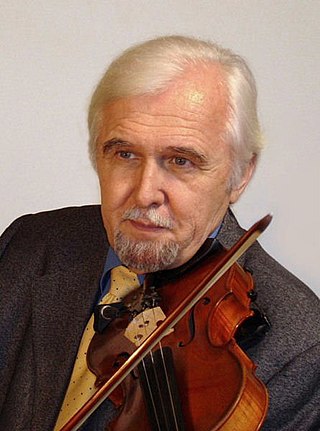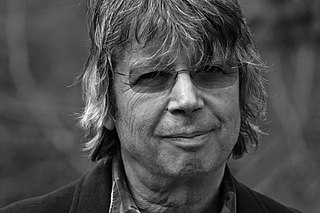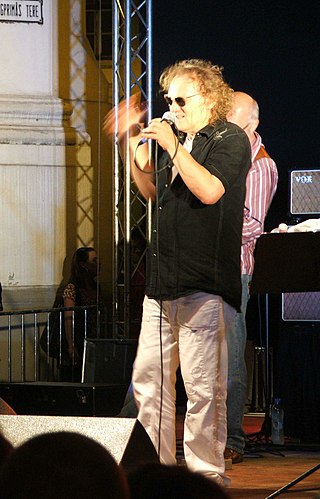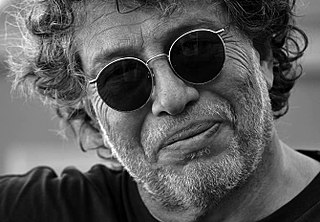
Gyula Babos (June 26, 1949 in Budapest - April 12, 2018 ibid) was a Hungarian jazz guitarist. [1] [2]

Gyula Babos (June 26, 1949 in Budapest - April 12, 2018 ibid) was a Hungarian jazz guitarist. [1] [2]
Babos was a part of the bands Kex, Rákfogó and Saturnus, and won the Jazz Competition of the Hungarian Radio in 1966. Since 1977 he taught guitar at the Franz Liszt Academy of Music, where he became teacher of several generations of Hungarian guitarists. In the 1990s he gave some great concerts. He appeared in the Petofi Hall in Budapest with Victor Bailey, Terri Lyne Carrington, György Jinda and Béla Szakcsi Lakatos, and gave a concert with Frank Zappa in front of 50,000 spectators.
In 1997 he founded the Babos Romani Project, with which he recorded the album Once upon a time… (Egyszer volt…) in 1998. In the same year he recorded three albums with the group Take Four (Aladár Pege, Rudolf Tomsits and Imre Kőszegi), followed by recordings with Herbie Mann in 2001.
In 2004 he released the album Seventy-five Minutes (75 perc) with Trilok Gurtu. In 2005 he founded the Babos Project Special, which included pianist Róbert Szakcsi Lakatos, violinist Öcsi Patai, upright bass player Viktor Hárs, drummer László Balogh and singer Mónika Veress. In 2006 they released the album Variations.
Babos was awarded the Gábor Szabó Award in 2003 and the Order of Merit of the Republic of Hungary in 2005.

Omega was a Hungarian rock band formed in 1962, which has been described as the most successful Hungarian band in history. They have released more than 20 albums both in Hungarian and English. After several early personnel changes, their classic lineup came together in 1971 and was intact for more than forty years. Singer János Kóbor was with the band continuously from 1962 until his death in 2021; keyboardist/singer László Benkő was present from 1962 until his death in 2020. Guitarist György Molnár and bassist Tamás Mihály joined in 1967, and drummer Ferenc Debreczeni joined in 1971. Omega won several prestigious awards for their contributions to Hungarian culture.

Antal (Tony) Pusztai is a classical guitarist who is known as both a jazz musician and a classical guitarist.
The Bolla Quartet is a jazz band based in Hungary.

Roby Lakatos is a violinist from Hungary who combines jazz, classical, and Hungarian Romani music.

Nikoletta Szőke is a Hungarian jazz vocalist who has won international acclaim as winner of the 2005 Shure Montreux Jazz Voice Competition. Since then, she has been pursuing an increasingly successful performing career.

Zoltán Latinovits was a Hungarian actor.

Csaba Deseo is a Hungarian jazz violinist born in Budapest.
Levente Egry is a Hungarian performing artist, composer, producer, performer, and pianist. He is the holder of the last Hungarian Diamond Record for over 100,000 records sold in Hungary. He started a classical-crossover project, Sentimental Piano Concert. After an early career in classical music, and acclaim as a jazz and pop artist, now he is now pursuing a career as a classical composer and pianist.

Ági Szalóki is a Hungarian folk singer. She has toured worldwide with world music and folk revival bands such as Besh o droM and Ökrös.

János Kristóf Bródy is a Hungarian pop singer-songwriter, guitarist, composer and scriptwriter. Successful both with the bands Illés and Fonográf and in his solo career, writing lyrics for singers like Zsuzsa Koncz or for rock operas like István, a király, he was a major figure of the Hungarian music scene in the 60s–90s.
Hungarian pop is the pop music scene of Hungary. It is often associated with Rezső Seress's song "Gloomy Sunday" which was covered by numerous artists. The most notable artists include Zsuzsa Cserháti, Kati Kovács, Zsuzsa Koncz, Judith Szűcs, Péter Máté, Locomotiv GT, Omega, Neoton Família, Karthago, Jimmy Zámbó. Among the new talents are Kállay Saunders and Linda Király.

Charlie is a Hungarian rock and soul singer.

Attila László is a Hungarian jazz guitarist and composer. László is one of the leaders of Hungary's second generation of jazz musicians, which includes Lakatos, Dés, Kőszegi, and Pege. He was president of the Hungarian Jazz Federation (1999–2005) and performed with Anthony Jackson, Randy Brecker, James Moody, David Friedman, Gary Willis, Bob Mintzer, Peter Erskine, Hiram Bullock, Miroslav Vitous, Ilaiyaraaja, Russell Ferrante, and Jimmy Haslip. Laszlo won the Golden Cross of Merit prize.
Viktor Tóth, alto saxophonist, composer and orchestra leader, has been awarded Jazz Musician of the Year several times. One of the top figures of the young generation of the contemporary Hungarian jazz scene, his performance style bridges styles, is improvisation-centred, "soaring" and filled with spirituality.

Gábor Presser is a Kossuth Prize winning Hungarian musician, composer, singer. He was a band member in Locomotiv GT and Omega, and has been a prominent personality in Hungarian pop and rock music.

Margaret Island, founded in 2014, is a Hungarian indie pop band, named after Margaret Island in Budapest. Their pop songs are combined with acoustic and folk elements. Their music is influenced by Mumford & Sons and Passenger. Their first album, Egyszer volt, was released in September 2015. The album includes the song Nem voltál jó, which was originally in English, Soaked in life, later translated to Hungarian by János Bródy. They are currently signed to Gold Record. They performed as the interval act for the first heat for A Dal 2017, the national selection for Hungary in the Eurovision Song Contest 2017, as well as the interval act for the second heat for A Dal 2018.

Hungária was a Hungarian pop-rock band formed by singer/guitarist/keyboardist Miklós Fenyő in 1967. Despite periodic suppression by the Hungarian Communist regime, by the early 1980s Hungária was one of the country's most popular bands.

Attila Kökény is a Hungarian singer, most notable for coming second in the fifth season of Megasztár and for his participation in A Dal.

Tamás István Berki is a Hungarian singer, songwriter, guitarist, drummer, television personality and teacher.

Béla Szakcsi Lakatos, also known by the mononyms Szakcsi or Sa-Chi, was an Hungarian jazz pianist, keyboardist, arranger and composer.